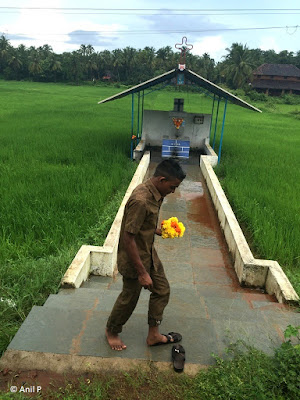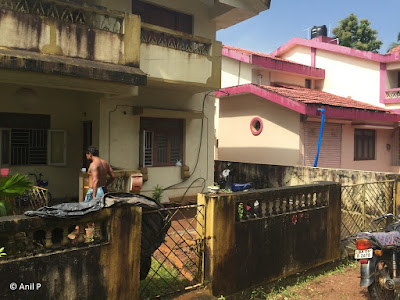It was a grey August morning when
I stepped out and made for the bus-stand for a bus to Margao. Clouds had opened
up from before dawn and the light had taken on a desultory tone.
I had woken up to rain
drops hammering corrugated sheets instead of the customary bird songs in the trees. If it wasn’t
for an appointment to keep at the Three
Kings Church
in Cuelim I’d have returned indoors and waited out the rain. Instead I
struggled with my umbrella and got into a mini bus for Margao.
The Kadamba mini bus was crowded and everyone
who had climbed aboard dry soon gave up on fending off raindrops trickling from
umbrellas as commuters packed tight in the aisle struggled to keep them from
wetting fellow passengers. There were too many umbrellas and too little space
to manoeuvre the hand in defence. Goan mini buses are mini in every sense of
the term.
We set off for Margao.
As the mini bus picked up speed,
the rain came horizontally at the windows. I had my task cut out between opening
them when the drizzle thinned and closing them shut when skies sent a volley of
mischievous downpour.
The mini bus began emptying out
as passengers got off at the various stops along the way.
As it crested the
hill in Borim, pausing by the St. Francis Xavier Church before the bridge over the Zuari, I got my
first good look at the skies leaden iron from heavy clouds brooding over lush
countryside.
Riding over the bridge at Borim enroute
to Margao and back never fails to bring back memories of growing up in Goa.
In time, past Camurlim, and Raia,
a familiar landmark at Fatorda emerged roadside, one I used to keep an eye out
for as a child – the PWD office building – because it meant Madgaon was around
the corner.
Past the PWD building, the traffic slowed down as it approached the
roundabout opposite Fatorda stadium. Three policemen stood roadside by a police
jeep.
A blue Maruti Suzuki car stood in the middle of a roundabout, in front of a two-wheeler it had knocked down – the two protagonists in the collusion, a common
sight on roads in Goan monsoons. I hoped it was nothing serious.
The mini bus made its way past the
mishap, to the bus-stand where I would board a Cansaulim-bound bus on my way to The Three Kings Church atop a hill.
~
A light drizzle fell over Margao bus-stand as I stepped off the mini bus and went in search of another bound for
Cansaulim. Mini buses were parked in two opposite rows, each servicing routes
into and out of Margao.
“Cansaulim?” I queried a bus driver
waiting by his bus.
"Last one," he said,
pointing to the end of the line. I walked up to the mini bus and finding empty seats managed to squeeze into one toward the front of the bus.
It was nearing ten in the morning.
An overcast sky lingered overhead, menacing scurrying passengers hoping to stay
dry on their way about the day.
No sooner I had settled into the
seat by the door, knees scrapping the backrest ahead, a man stumbled into the mini bus
with a large jute sack of flowers.
He returned with a second sack containing marigolds before hauling them both into the driver’s cabin. A fragrance of marigolds took hold of the bus and lent the morning a garden freshness.
Somewhere along the way the two sacks
will be dropped off at some flower market or maybe they’ve been requisitioned
for some event. Either way I’m glad I’ve marigolds for company.
Just as the bus starts up, a
speeding Maruti van comes to a halt at the door and a man leaps out from the driver's side before
hauling a basket of fish packed in ice from the back of the van to the bus,
leaving it on the steps as he returns for the second basket.
A fisherwoman hurries out of the van and requests the bus conductor, a lad in his early twenties, to let her
haul her basket of fish into the mini bus. It's a delicate bargain, for it's not unknown for passengers to turn their noses up and glare at the bus conductor should the fish choose an inopportune moment to perspire the hell out the air inside a crowded mini bus.
“I’ll give you 50/- extra,” she
cajoles him into agreeing. I suspected he'd agree without any blandishment.
Then a basket of ice lands over
the basket of fish. One more basket of fish follows and soon the fragrance of
marigolds collides with that of mackerels (bangde in Konkani).
The fisherwoman thanks the driver
of the Maruti van and takes a seat at the front of the mini bus before gathering the three baskets by her feet. She’s soaking wet.
“To Majorda,” she tells the bus
conductor, offering him the fare.
Her dress, unique to fisherwomen
from Salcete, marks her out as a Christian, not that her Konkani accent or the Cross around her neck had
left any doubt about it. She seemed hassled from the strain of transporting her
baskets of fish.
It’s likely she had bought these fish
straight off a fishing trawler that landed its catch that morning on some beach before travelling to Majorda to sell them roadside.
Soon after catching her breath
and arranging the baskets around her feet, she thanked the bus conductor for
helping her haul the baskets in, and turning to a fellow passenger she said,
"There were no rickshaws available today (to bring these baskets) so I came by
Maruti van.”
“Chal ya, chal,” (Let’s go) the
bus conductor called out over the hum of passengers, and the mini bus set off.
Soon after setting off, the minibus
stopped by a roadside Cross located in a paddy field. Two women were working
the field some way off.

The bus conductor got off the bus
with a garland of marigolds, and stripping off his sandals he walked down the steps
to the Cross bedecked with similar garlands offered by believers seeking
blessings of the Cross.
It soon became apparent that the mini
bus was making its first run of the day and the pious observance at the Cross was to seek blessings
for the unfolding day, a ritual that seeks a divine shield against the
vicissitudes of business and life, rather business of life or vice versa.
Offering prayers on the morning run is about seeking blessings for a “good day”
and the well being of the driver and the bus conductor, and hopefully of the passengers as well.
The fisherwoman watched the bus
conductor walk down the passage to the Cross shielded by corrugated sheets.
A candle-stand stood to one side,
blackened by burned out candles and heaped with two marigold garlands that had probably made way for a new one around Jesus Christ. The two women bent in the
rice field did not look up as the khaki clad bus conductor made his way to the Cross.
The lush green of the rice field
contrasted with the grey of the monsoons. The countryside was quiet.
Once there, he hung the garland
on the image of Jesus Christ and prepared to retrace his steps when the
fisherwoman called out to him from inside the bus asking that he bring back
marigold flowers from the garlands kept on the candle-stand.
At first he could not understand
her. Then he hesitated, for, the two garlands on the candle stand were
offerings made to Jesus Christ by someone and probably removed by another worshipper
to make way for his own garland. To mess with them would mean disrespect but
the fisherwoman in the bus would have none of his hesitation.
She implored he bring her some
flowers that had graced the Cross.
Soon passengers joined in. So he
reluctantly picked up one of the garlands left on the candle-stand and returned
to where he had left his sandals to put them on.
He plucked two flowers from
the garland and handed them over to the fisherwoman.
She smiled and touched them to
her forehead before sticking them into her basket of fish, considering the
basket suitably blessed by Christ.
A glow came over her. I imagined her day would go better now than when she started out in the morning, likely selling
all her fish for a tidy profit.
The driver changed gears and we
were off once again, but not for long.
He stopped at another roadside
Cross and this time the bus conductor got off with two garlands – one for Mother Mary
enclosed in a glass case and the other for the adjacent Cross.
A passenger alighted. The Sun has
broken through and lit up the village in a warm embrace.
Each time the minibus stopped at
myriad stops to take in passengers, mostly women going about their morning tasks,
the fisher-woman would smile and wish them, apparently regulars on the bus.
Talk would turn to fish and the
fish business. She lamented to them that fish prices have gone up and buyers balk at buying them in quantities they used to when they were affordable.
Earlier in the day, soon after
getting into the bus, she had requested the bus conductor to drop her before a
regular stop in Majorda, seeking assurances he would help her offload her
baskets. He had nodded in the affirmative. And as an incentive, she had said
she'd give him 50/-.
When the bus stopped at Majorda where the Konkan Railway line ran close, he helped her offload her three baskets of fish and ice,
much to her relief. She was getting on in years and a long day awaited her.
He didn't remind her of the 50/-
she had "promised" him, instead he smiled when she looked his way and
said "Dev Borrey Korum," (Konkani for May God Bless You) before
jumping back onto the foot-board. And we were off again.
A faint smell of fish from
offloaded baskets lingered on amidst fragrance of marigolds as the bus trundled
toward Cansaulim.
Her blessings to the bus conductor
stayed with me as I prepared to get off at the Florists shop off Cansaulim Church
and await P for a ride up to the Three
Kings Church.



































